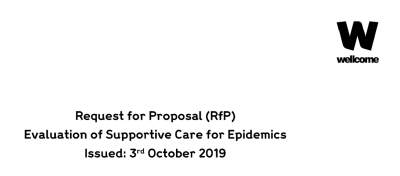Wellcome Trust
History
- 1853: Henry Wellcome is born in the US
- 1880: Burroughs, Wellcome & Co is established by Silas Burroughs and Henry Wellcome in London, UK
- 1936: Henry Wellcome dies and his various interests around the world are brought together as Wellcome Foundation, owned by the Wellcome Trust
- 1985: Wellcome Trust sells the first shares in Wellcome Foundation, which is renamed Wellcome Plc
- 1995: Wellcome Plc is bought by Glaxo to form GlaxoWellcome, which later becomes GlaxoSmithKline
- 1995: The Wellcome Trust – or now just Wellcome – has become an independent charitable foundation
- 2007: Wellcome Collection opens in London 1)
Links to sort
Wellcome, Pharmaceutical Firms Back UK Whole Genome Sequencing Project
September 12, 2019 - The Wellcome Sanger Institute in Hinxton, England, has announced a £200 million ($244 million) project to sequence the genomes of five hundred thousand volunteers and power the next wave of genetic and health research.
With funding of £50 million ($61 million) from the British government's research and innovation agency, UK Research and Innovation; £50 million ($61 million) from Wellcome; and contributions totaling £100 million ($122 million) from Amgen, AstraZeneca, GlaxoSmithKline, and Johnson & Johnson, the Whole Genome Sequencing project is expected to yield a rich data resource for scientists working to understand, diagnose, treat, and prevent diseases. Following a pilot project involving fifty thousand volunteers from UK Biobank — which was established in 2006 by Wellcome and UK government agencies to collect data and samples from five hundred thousand people between the ages of 40 and 69 — the Sanger Institute and deCODE genetics in Iceland will sequence the genomes of the remaining four hundred and fifty thousand volunteers.
According to project officials, the sequencing data will be linked to detailed clinical and lifestyle data for each volunteer to create an encyclopedia of genetic information that is expected to generate new insights into why some people develop particular diseases and others do not. While industry partners will have preferential access to the data for nine months before it is released to other researchers, data for the entire cohort is expected to be made accessible to the scientific and medical communities by early 2023.2)
Four reasons why we need multiple vaccines for Covid-19
November 2020 by Charlie Weller - Head of Vaccines Programme Wellcome
To bring the pandemic under control we will need to produce and roll out vaccines at a scale and speed never seen before. To meet the aim of vaccinating high-risk populations around the world by the end of 2021, we need at least 2 billion vaccine doses.
Moderna, for example, hopes to produce 500 million doses of their vaccine next year. But with each person requiring two doses to be vaccinated, it’s a long way off the full number required.
We have also never licensed or scaled-up an RNA vaccine before – the technology that the Moderna and Pfizer-BioNTech vaccines use – so there may be unforeseen manufacturing issues.
By developing and investing in multiple vaccine candidates we stand a much better chance of having the volume of doses we need to get the virus under control. 3)
High Risk Life Science Research
The London-based Wellcome Trust has announced the launch of a £250 million (approximately $332 million) fund that will invest in ambitious research programs with the potential to fundamentally change science and transform health over five to ten years.
The Wellcome Leap Fund will support scientists, technologists, and innovators from around the world, enabling them to pursue bold ideas that fall outside the scope of conventional life sciences funding because they are deemed too high risk, because they need to overcome a major scientific or technical hurdle, or because the individual with the idea does not have an academic background in the life sciences. The fund, which plans to begin funding projects by late 2020, seeks to support unconventional ideas and bring together outstanding individuals from a range of disciplines and sectors to work in parallel on solving problems. 4)
January 2022
London-based Wellcome has announced its intention to invest £16 billion ($21.79 billion) over the next decade in scientific research focused on addressing global health challenges, the largest funding commitment to science and health in its eighty-five-year history.
With an investment portfolio now worth £38.2 billion ($52.02 billion) — as a result of the strongest annual investment returns the organization has seen in twenty-five years (33 percent, adjusted for inflation) — Wellcome will boost funding to advance its new strategy, announced in 2020 and focused on mental health, infectious disease, and the health impacts of climate change. Over the last decade, the organization spent more than £9 billion ($12.25 billion) on research grants and other charitable activities, including £1.2 billion ($1.63 billion) in the 2020-21 fiscal year. Wellcome also committed an additional £750 million ($1.02 billion) to fund large-scale, high-impact projects over the next five years, which it anticipates will grow to £1 billion ($1.36 billion) next year.
As part of its new strategy, Wellcome will support cross-sector collaborations such as the Coalition for Epidemic Preparedness Innovations (CEPI), a public-private partnership Wellcome co-founded in 2017 that has played a pivotal role in bolstering COVID-19 response efforts and pandemic preparedness.
“These returns mark a step-change in Wellcome’s ability to fund and support new discoveries in science and health, and help solve three of the great challenges of the twenty-first century — climate change, infectious diseases, and mental health,” said Wellcome director Jeremy Farrar. “With plans to spend £16 billion on our mission over the next decade, we will be increasing our spending from the previous decade by more than 50 percent. This gives us a huge opportunity to increase our support for scientific research that will make a real difference to people everywhere in the years to come.” 5)
==== Epidemic Preparedness RFP ====
The Wellcome Trust (the ‘Trust’, ‘Wellcome’) is the world’s second highest spending global charitable foundation, and a unique scientific and cultural institution of global significance, scale and achievement. It is both politically and financially independent. Wellcome supports researchers, takes on big problems and sparks debate to improve health on a global level.
Our funding supports over 14,000 people in more than 70 countries to explore ideas, seek solutions and improve the human condition through science, population health, medical innovation, humanities and social sciences and public engagement.
The focus of this RfP is supportive care for high-risk or epidemic diseases. Supportive care is the baseline medical care that a patient receives after becoming ill with disease, and optimal provision of supportive care is fundamental to effective epidemic preparedness and response.
The care a patient receives during an outbreak not only affects an individual’s wellbeing and livelihood, but can also impact the shape of an outbreak at the population level by influencing the transmissibility of disease, health system resourcing and community trust. The level and quality of care provided to patients also impacts the field evaluation of experimental vaccines
The successful supplier will be expected to spend time at the WHO Headquarters in Geneva, and will be able to work at the Wellcome London office, or remotely, depending upon convenience. The successful supplier will report to Dr. Peter Hart (Wellcome Epidemics Project Officer) on a day-to-day basis and will be accountable to the below panel who will provide guidance and direction to the project throughout.
Epidemics SCG (ESCG) panel
- ▪ Dr. Josie Golding – Programme Manager, Epidemics (Wellcome)
- ▪ Dr. Peter Hart – Project Officer, Epidemics (Wellcome)
- ▪ Dr. Cathy Roth – Senior research fellow, Department for International Development (UK
- Government)
- ▪ Dr. Marie-pierre Preziosi – R&D Blueprint co-lead (WHO)
- ▪ Dr. Gail Carson – Chair, Research Subgroup (GOARN)
- ▪ Dr. Virginia Benassi – R&D Blueprint technical officer (WHO)
- ▪ Dr. Janet Diaz – Team Lead, Clinical Management, Health Emergency Programme (WHO)
- ▪ Dr. Ismaila Mamane Sani – Ministry of Health, Republic of Niger
Wellcome will provide the successful supplier with the following sources of information and relevant stakeholder connections for the duration of the evaluation, to help them answer these research questions-
- • A top-line briefing on the history to the project including details of discussions with
- relevant parties and sources of information
- • A list of networks, stakeholders and meetings relevant to epidemics and the planned
- project
- • Access to panel for input requests and/or project guidance 6)
Woke Wellcome
 At Wellcome, the Pride logo represents the changes we want to see in how we operate as a funder and employer, and the changes we want to see in research culture and the wider science and research sector. We're proud that many Wellcome-funded centres are changing their logos too.
At Wellcome, the Pride logo represents the changes we want to see in how we operate as a funder and employer, and the changes we want to see in research culture and the wider science and research sector. We're proud that many Wellcome-funded centres are changing their logos too.
We’ve changed our logo on our social channels and on our homepage banner based on the Pride flag design by Daniel Quasar. It builds on the usual Pride flag by adding stripes that emphasise groups within the LGBTQ+ community that often experience marginalisation. 7)
This includes-
- trans and non-binary people – represented by the white, light pink and light blue stripes
- LGBTQ+ people of colour – represented by the brown and black stripes
- people living with AIDS and those who have died from it – represented by the black stripe.
Developed in collaboration with our LGBTQ+ network at Wellcome, we're launching a new trans inclusion policy for our staff. 8)

